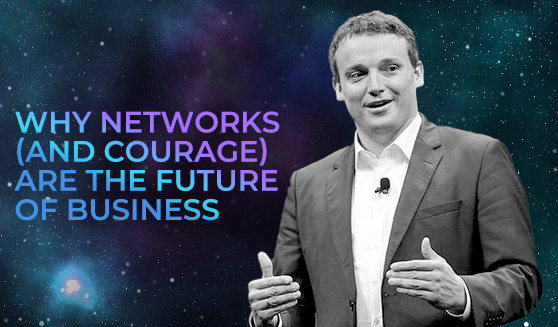
It seems obvious now he’s said it, doesn’t it? But Klein wasn’t just talking about traditional networking. He wasn’t waxing lyrical about the power of community and collaboration in a very conventional sense (although we do believe in that, too). At SAP, networks are being transformed in a new way — using blockchain technology.
Sometimes, a person says something that perfectly articulates a concept you believe in 100%, but have never been able to put into words succinctly. #LEAP22 speaker Christian Klein (Chief Executive Officer at SAP) did that for us when he said:
“In a digital world, no one does business alone. You have to connect.”
It seems obvious now he’s said it, doesn’t it? But Klein wasn’t just talking about traditional networking. He wasn’t waxing lyrical about the power of community and collaboration in a very conventional sense (although we do believe in that, too). At SAP, networks are being transformed in a new way — using blockchain technology.
Networks can overcome the biggest challenges in business
Outlining the key challenges that keep business leaders up at night, Klein cited business transformation (how to keep up with the constantly evolving landscape), supply chains, and sustainability.
To solve those challenges, you have to do much more than adapt to new technology. Instead, you have to build tech into your operations in ways that give you a zoomed-in understanding of your consumers, your suppliers, your distributors, and your products themselves.
Companies across industries are doing this to different degrees. Consumer goods incumbent Unilever, for example, uses AI in its recruitment process. Powered by AI recruitment specialist Pymetrics, an online platform uses gaming and video to test and analyse candidate suitability, getting to know future team members via tech. This streamlines the recruitment process across 190 countries and allows Unilever to place people in the roles they’re best suited for.
On a deeper operational level, Andrew Callaghan (a Principal at technology services firm Crowe) encourages his clients to leverage ‘digital twin modelling’ to manage supply chain disruptions. Modelling software integrates real-time information to create a twin — a digital representation — of a company’s supply chain. Paired with machine learning analysis, the twin can then provide actionable insights into what’s happening across a supply chain network made up of (potentially) thousands of global touchpoints.
“Digital twins can help businesses digitise their supply chain from raw material providers to suppliers, manufacturing plants and distributors all the way to the customer,” Callaghan said in an interview with Forbes.
But what if your digitised supply chain could offer instant, multi-directional information-sharing between a huge number of enterprises? What if a tech network could enable you to trace and understand every aspect of your product journey, and present you with the data you need to make logical choices about everything; from your bottom line, to environmental, social, and governance (ESG) factors?
SAP is using blockchain to do just that. It’s an open network that enables business partners to connect and share information, and build out operations based on transparency and collaboration. From material traceability to freight collaboration, it provides alerting for product issues and supply chain disruptions, along with financial and ESG insights. And it makes sense — the future of business in a world that is increasingly connected in digital spaces should rely on networks and collaboration. COVID-19 has shown us that the companies with strong networks are more agile, and therefore more resilient.
But to embrace a network, courage is needed
Having the technology to tap into such a network is only one piece of the puzzle. Another huge piece is whether or not a company is willing to make big changes in the way it works.
As Klein put it, “if you’re not changing the way your enterprise runs, then new technology will only have a limited impact.”
“Because a business transformation of this scale and magnitude requires more than technology. It requires courage.”
New innovations must be connected back to company culture, and to the people-centric changes you’re implementing at the same time. You have to be willing to look at the challenges you’re facing and lean into them, instead of avoiding them.
For a company’s leaders, “it’s about realising that my business is changing,” Klein said, “realising that certain industries are getting disrupted, realising that when I want to enter the next level of growth and productivity, I have to change how my company works. And that’s often the hardest part, because this means telling your people, your investors, your customers, ‘we have to change’.”
On a personal, human level, it takes courage to open up to someone else and share your inner world so that you can understand one another better, support each other better, and cultivate inner resilience. Brené Brown’s famous TED talk on vulnerability, way back in 2010, springs to mind.
Although business is less personal (or at least, that’s what The Godfather taught us), the same idea can apply to building networks in business. It takes courage to share real-time operations with total transparency in a blockchain network. When your distributors join you in such a network, for example, they do so with the knowledge that if something goes wrong — if they’re not able to deliver on time — everyone else in the network will be able to see the challenges they’re facing, and choose whether to take business elsewhere.
But that transparency, that vulnerability, comes with power to strengthen business resilience for every enterprise in the network: because it creates a culture of trust. And trust creates the foundation for long-term, lucrative, transformative collaboration.








